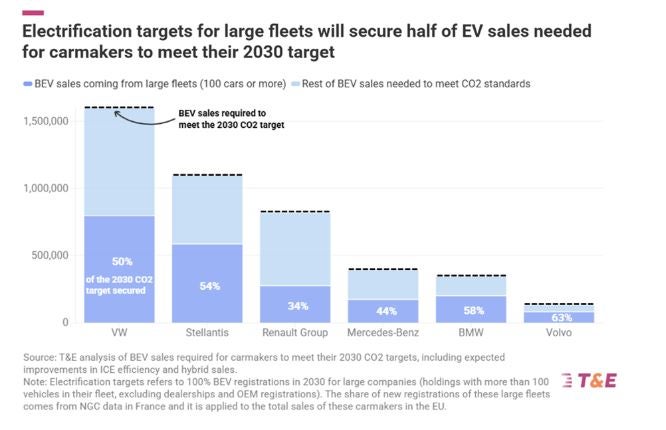
The environmental group Transport & Environment (T&E) has urged the European Commission to introduce binding electrification targets for large corporate fleets, arguing that such measures are essential for both climate goals and industrial competitiveness.
According to T&E, a new EU law requiring corporate fleets to transition to electric vehicles (EVs) could create demand for more than two million EVs by 2030 and significantly support European car manufacturers.

Stef Cornelis, director of T&E’s electric fleets programme, emphasised the importance of ambitious policies: “Today more than ever before, Europe needs climate policies that also strengthen our competitiveness. Electrification targets for large fleets do exactly that: we ask large companies to go faster on electric and as such boost demand for more than two million EVs made by European car manufacturers.”
T&E has called for an EU-wide mandate requiring all corporate fleets with more than 100 vehicles to purchase only electric models from 2030 onwards. European automotive groups could particularly benefit, as corporate sales represent 62% of their total car sales compared to 49% for non-European manufacturers.
The European Commission is preparing legislation to accelerate the electrification of large corporate vehicle fleets, a move that could bolster demand for EVs and support European car manufacturers. The initiative will be a key component of the Automotive Industrial Action Plan, which Commission President Ursula von der Leyen is set to present on 5 March.
The EU Transport Commissioner has been tasked with drafting the legislation, which could contribute significantly to carmakers’ efforts to meet binding CO₂ emissions targets. Analysis suggests that fleet electrification could account for around half of the EV sales needed to avoid penalties, with figures rising to 54% for Stellantis and 58% for BMW.
Access the most comprehensive Company Profiles
on the market, powered by GlobalData. Save hours of research. Gain competitive edge.

Company Profile – free
sample
Thank you!
Your download email will arrive shortly
We are confident about the
unique
quality of our Company Profiles. However, we want you to make the most
beneficial
decision for your business, so we offer a free sample that you can download by
submitting the below form
By GlobalData
The corporate car market is the EU’s largest automotive segment, accounting for approximately 60% of new vehicle sales. However, despite its potential to drive the EV transition, companies are not transitioning to electric significantly faster than private buyers. Currently, 14.3% of corporate fleet purchases are electric, compared to 13.6% in the private market. In Germany and France, the EU’s two largest car markets, corporate fleet electrification is even slower than that of private households.
The EU Commission launched a dialogue on the future of the European automotive industry in January, led by von der Leyen. This initiative aims to address key challenges in the sector and sustain its economic contribution. A binding EU fleet electrification law could support European manufacturers’ investment in electric vehicles while also expanding the supply of affordable used EVs. T&E estimates that such a law would add nearly seven million used EVs to the second-hand market by 2035. Given that nearly 80% of Europeans buy their cars used, this could significantly impact market accessibility.
T&E has also urged the European Commission to introduce an EU-wide eco-score initiative, similar to France’s ecobonus scheme, to incentivise the production of low-carbon EVs using clean materials. The proposal includes a requirement for corporate EVs to meet a specified eco-score threshold, which would favour vehicles produced in Europe where cleaner energy sources are used in manufacturing.
Cornelis emphasised the need for swift action: “As a next step, the European Commission needs to move forward quickly by announcing binding electrification targets for large fleets. This will create investment certainty, not only for carmakers but also for other key sectors such as the charging infrastructure industry, helping them plan grid infrastructure roll-out and investments.”
The Commission’s legislative proposal and the upcoming Automotive Industrial Action Plan will shape the regulatory landscape for fleet electrification in the EU. If implemented, the law could play a critical role in helping European automakers meet emissions targets while stimulating demand for domestically produced EVs.

